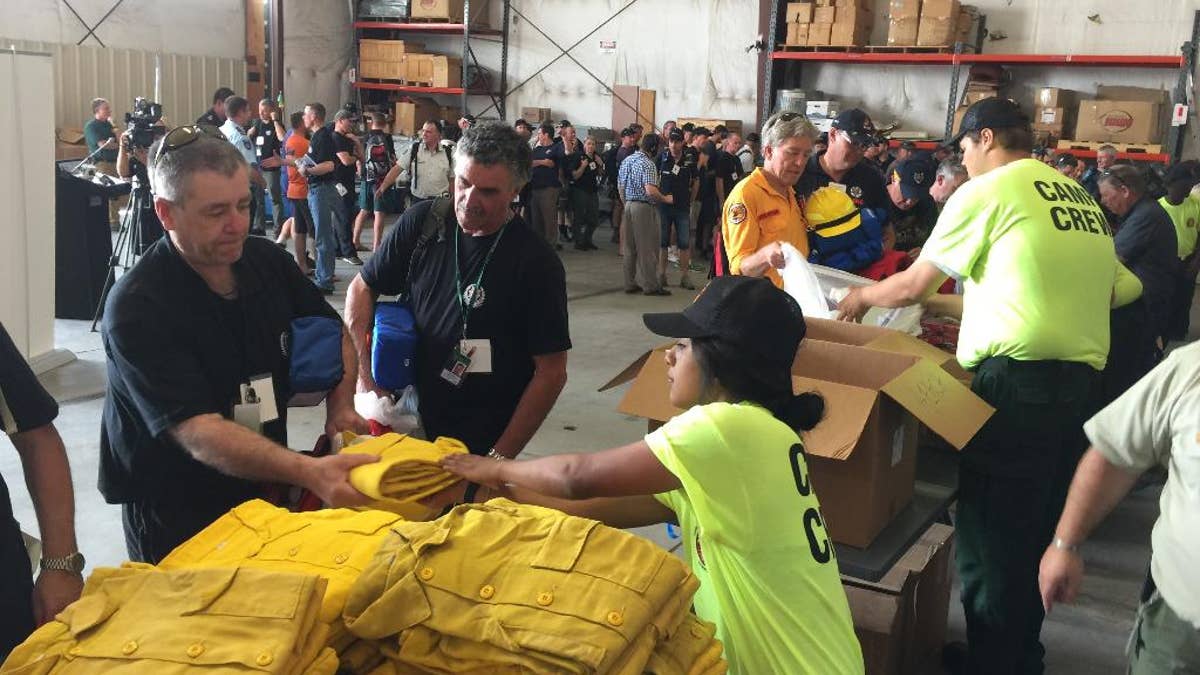From down the road to Down Under, help arrives to help fight record fire in Washington
{{#rendered}} {{/rendered}}
Warren Heslip, 47, of Southland, New Zealand, receives a yellow firefighting shirt on Monday, Aug. 24, 2015 at the National Interagency Fire Center in Boise, Idaho. Australian and New Zealand firefighters have arrived in the United States and prepared to fan out to help fight wildfires burning in several western states. (AP Photo/Keith Ridler) (The Associated Press)
The mountainous conditions in the Pacific Northwest will be nothing new to the dozens of firefighters from Australia and New Zealand who have arrived to help battle the many blazes burning unchecked in the region.
"We're used to tall timber and steep territory," said Warren Heslip, a 47-year-old firefighter from Southland, New Zealand.
Heslip was among the 71 firefighters from the southern region picking up equipment Monday at the National Interagency Fire Center in Boise, Idaho, before heading out to help a ground campaign led by firefighters from across the West and augmented by U.S. soldiers.
{{#rendered}} {{/rendered}}The flames that claimed the lives of three firefighters in Washington, injured four others and burned 200 homes also inspired an outpouring of volunteers who have been invited for the first time in Washington state history to help battle the blazes.
This summer's fire response across the West has been overwhelmed by destructive blazes tearing through the tinder-dry region.
The biggest fire burning Monday was in Washington's Okanogan County on the Canadian border, where a group of five fires raging out of control became the largest in state history, scorching more than 400 square miles, fire spokesman Rick Isaacson said.
{{#rendered}} {{/rendered}}Lightning-sparked fires broke the state record, surpassing blazes that destroyed more than 300 homes in the same county last year.
"I'd like to set some different records," Okanogan County Sheriff Frank Rogers said.
The U.S. is in the midst of one of its worst fire seasons on record with some 11,600 square miles scorched so far. It's only the sixth-worst going back to 1960, but it's the most acreage burned by this date in a decade, so the ranking is sure to rise.
{{#rendered}} {{/rendered}}So many fires are burning in the state that managers are taking extreme measures, summoning help from abroad and 200 U.S. troops from a base in Tacoma in the first such use of active-duty soldiers in nine years.
Jim Whittington, a Bureau of Land Management spokesman in Portland, Oregon, said military assets cannot be used against wildfires until all civilian resources are deployed.
Since 1987, active duty military personnel have been mobilized to serve as wildland firefighters a total of 35 times. The last time was in 2006.
{{#rendered}} {{/rendered}}Since then, it has not been necessary to ask for military assistance until this fire season, Forest Service officials said.
Nearly 4,000 volunteers also answered the state's call for help, far more than will be accepted, said state Department of Natural Resources spokesman Joe Smillie.
The state is looking for former firefighters or heavy equipment operators who can bulldoze fire lines to corral the blazes and keep them from spreading in mountainous, timber-covered areas. So far, about 200 people with the right experience have been cleared to work.
{{#rendered}} {{/rendered}}The dozens of firefighters from Australia and New Zealand who arrived at the National Interagency Fire Center in Boise, Idaho, were being outfitted to fill a critical shortage of mid-level fire managers such as equipment bosses, strike team leaders and supervisors.
The Southern Hemisphere nations have been partners with the U.S. for more than 50 years, able to lend out firefighters because the severest part of their fire seasons occur at opposite times of the year. The last time the U.S. asked for their help was 2008, with 50 firefighters arriving. The U.S. sent firefighters abroad in 2007.
Costs for the international firefighters will be paid by the agency they're assigned to, officials said, though no estimate was yet available.
{{#rendered}} {{/rendered}}Chris Arnol, international liaison for Australia and New Zealand firefighters, said at a news conference in Boise the firefighters were ready to assist.
"We understand how tough it is for you guys and we're happy to help," he said.
Simon Martin, 40, firefighter from Collie, Australia, agreed.
{{#rendered}} {{/rendered}}"I'm sure there are a lot of fatigued firefighters out there," he said.
___
Geranios reported from Spokane, Washington. Associated Press writer Brian Melley in Los Angeles contributed to this report.
